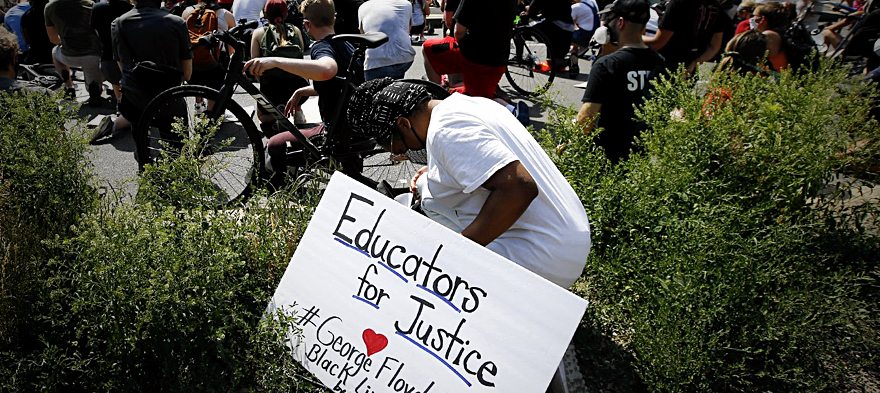
Jul 16, 2020 11:43:00 AM
Last Sunday educators, students, and families marched in Philadelphia demanding a long overdue anti-racist action in the city’s schools, insisting that anti-racism “be the overarching theme of every single school in the city.”
In response, Philadelphia Superintendent Dr. William hite has called for the “formation of a district-wide equity coalition and pledged policy and curricular changes” that will purportedly include antiracist training for staff, the majority of whom are White.
Affluent suburbs are following suit as Cherry Hill and Lower Merion have similarly signaled they will review curricula and teacher training programs to promote anti-racist teachings.
This is necessary work that is long overdue.
But one thing must be made clear to teachers in all districts; they work within a purposefully unjust, unequal, anti-Black, White supremacist system.
[pullquote]Teachers cannot go about their work thinking their classrooms are beacons of justice and antiracism without fully understanding the system students are up against.[/pullquote]
Teachers must understand the long and continuing legacy of legal and government supported residential segregation, from color-coded maps determining which communities should be offered mortgages and which should not, to neighborhood covenants guaranteeing racial exclusion to home ownership.
Teachers must understand how such segregation prevented access to the quintessential American method of generational wealth, the buying of a home, and how that has contributed to the neighborhood wealth disparities that result in educational funding gaps.
Teachers must understand the perverse funding formulas at work across the country, wherein 48% of all education funding comes from local property taxes, thereby ensuring wealthy districts like Lower Merion can afford to spend roughly $28,000 per student while Philadelphia can barely afford $14,000.
Teachers must understand the school-to-prison pipeline by seeing the disturbing, though unsurprising, similarities between the disciplinary disparities by race and disability and the nation’s incarceration rates.
Teachers must understand how curriculum choices serve to perpetuate White supremacy by focusing on diluted messages from Martin Luther King’s "I Have A Dream," but not his "Letter from Birmingham Jail," by holding up Brown v. Board of Education as the end of segregation while neglecting to describe the shortcoming of the decision or the unintended consequences of the decimation of the Black teaching population, and by year after year teaching false histories of Columbus and Thanksgiving while failing to teach true history like the Tulsa Race Massacre in 1921.
And, while doing this necessary work, schools and teachers need to evade the pitfalls of doing this work solely for performative purposes and the sinister unintended consequence of this work resulting in lowering bars of excellence for their students. Lisa Delpit in her must-read "Other People’s Children" reflects on the phenomenon of well-intended White educators misdirecting their antiracist work to the detriment of the very students they intend to serve, noting that “a critical thinker who lacks the ‘skills’ demanded by employers and institutions of higher learning can aspire to financial and social status only with the disenfranchised underworld.”
It is undeniable that a student who is taught by a racist teacher is not receiving justice.
It is also undeniable that a student who is ineffectively taught by an anti-racist teacher is not receving justice.
[pullquote]For districts planning to tackle anti-racist practices this fall, the work starts with being honest about the systems within which we work[/pullquote], while at the same time ensuring that becoming anti-racist educators includes, indeed necessitates, educators who simultaneously understand the broken system in which they teach while also educating students with the skills they will need in order to dismantle that system.
Zachary Wright is an assistant professor of practice at Relay Graduate School of Education, serving Philadelphia and Camden, and a communications activist at Education Post. Prior, he was the twelfth-grade world literature and Advanced Placement literature teacher at Mastery Charter School's Shoemaker Campus, where he taught students for eight years—including the school's first eight graduating classes. Wright was a national finalist for the 2018 U.S. Department of Education's School Ambassador Fellowship, and he was named Philadelphia's Outstanding Teacher of the Year in 2013. During his more than 10 years in Philadelphia classrooms, Wright created a relationship between Philadelphia's Mastery Schools and the University of Vermont that led to the granting of near-full-ride college scholarships for underrepresented students. And he participated in the fight for equitable education funding by testifying before Philadelphia's Board of Education and in the Pennsylvania State Capitol rotunda. Wright has been recruited by Facebook and Edutopia to speak on digital education. In the wake of the COVID-19 pandemic, he organized demonstrations to close the digital divide. His writing has been published by The Philadelphia Inquirer, The Philadelphia Citizen, Chalkbeat, Education Leadership, and numerous education blogs. Wright lives in Collingswood, New Jersey, with his wife and two sons. Read more about Wright's work and pick up a copy of his new book, " Dismantling A Broken System; Actions to Close the Equity, Justice, and Opportunity Gaps in American Education"—now available for pre-order!
The story you tell yourself about your own math ability tends to become true. This isn’t some Oprah aphorism about attracting what you want from the universe. Well, I guess it kind of is, but...
If you have a child with disabilities, you’re not alone: According to the latest data, over 7 million American schoolchildren — 14% of all students ages 3-21 — are classified as eligible for special...
The fight for educational equity has never been just about schools. The real North Star for this work is providing opportunities for each child to thrive into adulthood. This means that our advocacy...
Your donations support the voices who challenge decision makers to provide the learning opportunities all children need to thrive.
Ed Post is the flagship website platform of brightbeam, a 501(c3) network of education activists and influencers demanding a better education and a brighter future for every child.
© 2020–2024 brightbeam. All rights reserved.
Leave a Comment